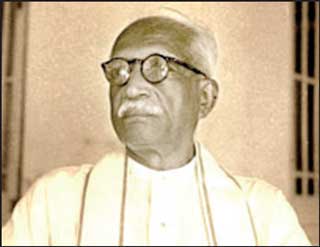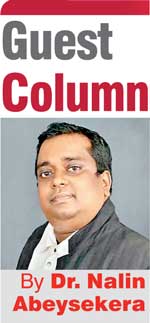Wednesday Feb 18, 2026
Wednesday Feb 18, 2026
Wednesday, 28 July 2021 00:05 - - {{hitsCtrl.values.hits}}
 |
| The implementation of this free education scheme put an end to the social inequality that was inherently promoted by the colonial education system. For this reason, Kannangara is remembered as the ‘Father of Free Education’
|
As Sri Lankans, most of us are blessed with the free education of this country. If you compare this blessed word, ‘free education’, with the globe, you would understand more value of this.
And we have seen people just consider free education as being all about ‘education for free’ and think it is merely like a product or service given free of charge. In this context, Jayawardena (2013) defined free education as ‘Free education is not only to provide ‘education’ at free of cost but to provide equitable access to every child irrespective of the demography, exploit the individual strengths and cultivate good values to become a law-abiding citizen’.
The actual meaning of ‘free education’ needs to be the communicated for all who are blessed with this as we can see people could not understand the real value of it in Sri Lanka. As per Khosla (2019), “Sri Lanka has shocked the world with its success in its system of education. Within less than forty years of independence, the number of schools has increased by 50 percent. In fact, the number of students has increased by 300 percent.”
 With this blessed ‘free education’, we should not forget the name of a ‘blessed person’, Dr. C.W.W. Kannangara, Father of Free Education. This is what I have extracted from the site of United Nations Sri Lanka: “In 1943, Dr. C.W.W. Kannangara the Minister of Education, introduced the Free Education Bill in the State Council. After much debate, it was approved for implementation and on 1 October 1945 the Free Education Policy came into effect. This policy states that every child above the age of five and not more than sixteen is entitled to free education. It has benefited generations of students and has enabled Sri Lanka to succeed in achieving the Millennium Development Goal of Universal Primary Education.”
With this blessed ‘free education’, we should not forget the name of a ‘blessed person’, Dr. C.W.W. Kannangara, Father of Free Education. This is what I have extracted from the site of United Nations Sri Lanka: “In 1943, Dr. C.W.W. Kannangara the Minister of Education, introduced the Free Education Bill in the State Council. After much debate, it was approved for implementation and on 1 October 1945 the Free Education Policy came into effect. This policy states that every child above the age of five and not more than sixteen is entitled to free education. It has benefited generations of students and has enabled Sri Lanka to succeed in achieving the Millennium Development Goal of Universal Primary Education.”
I have seen many scholars on the globe (only few can be seen in Sri Lanka) have written on Dr. Kannangara and his remarkable contribution to the education sector. This country should read and respect this ‘unsung hero’. One scholar Willemijn Wuister (Colonial & Global History, Leiden University, Netherlands) in his study in 2018 titled ‘Colonial Education: A case study of education in late-colonial Ceylon from the 1930s until independence’ allocated one section for Dr. Kannangara and his contribution to education sector. Refer to the excerpts below:
“Kannangara proposed the idea of free education, in which education would be free ‘from Kindergarten to University’, for every citizen of Ceylon.” It meant that every pupil was free of paying any fees for education. It took him 16 years of lobbying and advocating in the State Council, before his plan of free education became reality in Ceylon in 1945. The implementation of this free education scheme put an end to the social inequality that was inherently promoted by the colonial education system. For this reason, Kannangara is remembered as the ‘Father of Free Education’ in Sri Lanka nowadays.
Wuister (2018) argued, “A lot has already been written about education in the Commonwealth countries. For unclear reasons, Ceylon always seems to be left out of these studies. This is remarkable since a system of ‘free education’ was set up in Ceylon in the 1930s and implemented in the 1940s. The ‘system’ refers to all the primary and secondary schools in Ceylon and other forms of education that were offered, for example the University of Ceylon which was established during this period as well. An important outcome of the implementation of free education, is that the literacy rates in Sri Lanka have become very high compared to other Commonwealth countries like India, Bangladesh and Pakistan.
“Nowadays, the literacy rate in Sri Lanka is much higher in comparison with the worldwide standard. The period in which the fundaments of this system were laid is therefore important to analyse.” (Wuister, 2018).
It is important to note, “Immediately the educational reports presented in 1944 M.S. Aney who had come as a representative of India to listen to the Free Education Bill walking to Dr. Kannangara stated that had he presented this Bill in India as an Indian, he would have been worshipped as a god. Giving the right of free education to all the children in Sri Lanka was implemented.” (Sedere, 2016).
As Sedere (2016) vividly elaborated, our ‘Father of Education’ has lost his seat within two-three years after he introduced free education to this country. “To the surprise of many the hero Dr. C.W.W. Kannangara who brought about free education and liberated the rural poor, lost his seat at the next parliamentary elections in 1947. Mr. Wilmet A. Perera defeated Dr. Kannangara with the help of the affluent rich and the socialists camp.” (Sedere, 2016).
We have seen that Sri Lankans are really famous for celebrating many heroes. I would like to suggest that everyone who has gained from free education should take ‘The Oath of Kannangara’ by pledging: ‘To mark the respect to free education we will perform our duty to the nation forever by contributing to general public and country at large’.
(The writer is a Professor in Management Studies at the Open University of Sri Lanka and can be reached on [email protected].)